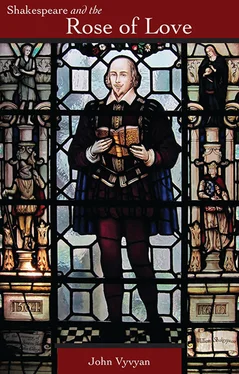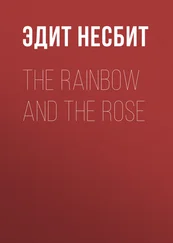For Venus sonne / dan Cupido
Hath sowen there of loue the sede… 1617
Dan Cupid, we may notice in passing, is a somewhat uncommon title that Berowne also uses in recalling the moment when he was likewise smitten. The dreamer is now certainly in danger:
And for the sede that here was sowen
The welle is cleped / as is wel knowen
The welle of Loue… 1627
He looks in; and at the bottom of the well he sees the two marvellous crystals that reflect and contain the whole garden in themselves. These are the lady’s eyes, into which he gazes for a long while. A rose garden is revealed in their depths, and one of the rosebuds is particularly captivating:
Whan I had smelled the sauour swote
No wyl had I fro thence yet go… 1707
He is caught, first by the fascinating crystals and then by the perfume of the rosebud, her eyes and her love; so the god’s moment has come, he looses his arrows – five of them – and the dreamer becomes the lover. Thereupon, as we have already noticed, it is not to the lady that he kneels, but to the god; and he receives, in a very long speech, Love’s commandments, which are by no means easy to keep.
We might fairly say that, in the ‘religion’ of love, the lady’s eyes represent the baptismal font. And in Dante, for whom love takes on a mystical significance, which can hardly be attributed to The Romance of the Rose , this subtle meaning becomes more evident. I am not affirming that Shakespeare was directly influenced by Dante, but that both of them – together with Guillaume de Lorris, Chaucer and many more – were nourished by a common tradition, virtually a faith, to which each made a unique contribution. They share the idea that falling in love is something more than a romantic experience; it is also a rite of initiation into a new life.
On the first page of the Vita Nuova , Dante speaks of the moment – ‘When first the glorious Lady of my mind was made manifest to mine eyes.’ *And in association with this event, he tells us – ‘There is a rubric, saying, “Here beginneth the New Life”…’ Incipit Vita Nuova . Since Dante’s relations with Beatrice were always of ‘ fino amore ’, imaginative and mystical, we may detect the baptismal nature of this experience more definitely than in that of the dreamer at the fountain. Dante was no doubt precocious in entering on this higher love-life at the age of nine! But he did not begin to write the Vita Nuova until he was twenty, and he was at least thirty before he finished it; so that the work itself, especially by the standards of poetic genius, is mature. As it proceeds, what we may call the ritual significance of the eye becomes even greater.
In the sonnet beginning:
Amore e ‘l cor gentil sono una cosa , †
Dante introduces the theme of love as power. And explaining the sonnet himself, he says that in the first part – ‘I speak of him according to his power. In the second, I speak of him according as his power translates itself into act.’ *This theme he expands; and the following sonnet,
Negli occhi porta la mia donna Amore , †
is thus interpreted – ‘I say how this lady brings this power into action by those most noble features, her eyes; and … I say how she with power makes noble that which she looks upon; and this is as much as to say that she brings love, in power, thither where it is not … I say how she brings love, in act, into the hearts of all those whom she sees … I tell what she afterwards, with virtue, operates upon their hearts.’
Here, in extreme compression, as within a seed, is a philosophy of love as a transforming principle – power, act, and virtue. In Love’s Labour’s Lost , Shakespeare announces in his own way (I do not imply a conscious connection) the same theme, and he never forgot it; by the time he comes to Measure for Measure , the theme is in its third phase, forth-going virtue; and by this he resolves tragedy. If, then, the lady’s eyes are conceived symbolically, as the font of love, where these tremendous possibilities begin, they may well have been the point of the earlier version of Love’s Labour’s Lost ; and the affirmation of love as power is, perhaps, the additional point of the second version.
It is not necessary to affirm that Shakespeare was in debt to Dante; nor need it be denied. The first printing of the Vita Nuova was made in Florence in 1576. At that time, when England was looking to Italy as the land of culture, nothing that the Italian presses turned out passed unnoticed. And in the cultivated circles which Shakespeare undoubtedly frequented, he may well have heard these fecund ideas discussed. I will not rate this higher than a possibility, but that an idea that has an affinity with Dante’s was a dynamic part of his own philosophy can, I think, be shown.

At the end of the fourth act, then, we may say – irrespective of Dante – that the young men have entered on a new life. The fact that they have done so in a lighthearted manner does not make it less novel; but as Shakespeare’s intention is to bring the play to a serious conclusion – probably more serious in the second version than in the first – he must show this levity to be inadequate, and then change it into something else. At this time, perhaps, he had not himself experienced the torments of love that may change it into a destructive force; if that is so, part of the importance of these early plays may be that he is creating, in relative calm, an ideal to which he himself was able to hold when the storm broke on his own life. We have no biographical details; but his poetry is enough to tell us that he had lived through the hell as well as the heaven of the heart. Here, however, he seems to be personally at peace. And he ends the act with a glorious battlecry!
LONGAVILLE: Shall we resolve to woo these girls of France?
KING: And win them too…
BEROWNE: Advance your standards, and upon them, lords;
Pell-mell, down with them!
But the girls of France are not to be conquered in this crude manner. Again, perhaps, Shakespeare is remembering the allegory of the Rose. Acceptance by the god of love is a privilege, and it is granted only under certain conditions:
For curteys / and of fayre manere
Wel taught / and ful of gentylnysse
He muste ben / that shal me kysse… 2006
And first of o thyng warne I the
That payne and great aduersyte
He mote endure / and eke trauayle
That shal me serue / without fayle: 2012
In the fifth act, Shakespeare makes, in effect, the same stipulations. And he goes on to strip the last insincerities from love, in order that the quality itself may shine out clearly.
The young men begin by sending jewels to their ladies, accompanied by:
… as much love in rhyme
As would be cramm’d up in a sheet of paper,
Writ o’ both sides of the leaf, margent and all…
That will not pass; it is only good for laughter, and the girls dismiss it as:
A huge translation of hypocrisy…
The lords then come in person; but they are in disguise, dressed up as Russians. Clearly, this is part of a parable on semblance and reality. Boyet has heard the plan being hatched, and he warns the princess:
Love doth approach disguised…
The penalty for this little trick is that the ladies also mask themselves, and exchange the jewels that have just been sent to them. When the men arrive, each woos the girl who is wearing his own gift, and so vows fidelity to the wrong one. The king proposes to Rosaline, assuming her to be the princess; and when asked why he thought her to be so, he replies:
Читать дальше












